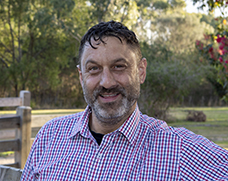Department of Social and Philosophical Inquiry

We explore critical questions about our communities and the world from a range of disciplinary perspectives and are attentive to the problems and issues faced by local and global communities.
Our researchers explore the impact of policies, governments, cultures and our changing physical worlds on the most disadvantaged. Our aim is to inform how human consciousness and action can overcome those systems and attitudes that seek to maintain inequality and uphold injustice.
Our students seek to understand and develop responses for peaceful, sustainable and resilient communities, make meaningful contributions to better policy outcomes, be aware of discourses about politics, religion, gender, and critically engage with the principles that govern human life and morality across civilisations, ancient and modern, and all racial and ethnic backgrounds.
Our courses
Whether studying war, peace and conflict resolution, forensic technologies and investigation techniques, First Nations knowledges, reconciliation and post-colonial methodologies, justice and human rights, globalisation, or international relations, our students are empowered to questions and explore their area of interest.
Criminology
Peace Studies
Philosophy
Political and International Studies
Sociology
Studies in Religion
Our Short Courses (Coming soon)
Stay tuned – more details coming soon!
Our research
Our researchers ask the critical questions needed to understand the impact of policies, governments, cultures and our changing physical worlds on the most disadvantaged. Our national and international research collaborators ensure the most up-to-date practices in driving positive social change. Our research explores the experiences and issues associated with particular events and points in history and how these have influenced society and culture today. Our current research includes: Our researchers explore the underlying causes of tension and conflict around the world and seek to work with governments and communities on long-term solutions for peaceful and resilient communities. Our research includes: Partnering with the NSW Police Through our close collaboration with NSW Police, we are able to ensure our research, data and initiatives in criminology directly contribute to improving the health and wellbeing of the communities we serve. Through research and data collection on issues such as stock theft, illegal hunting, drug and alcohol use and others, we provide the insights into crime issues and perceptions that can help understand and deter criminal activity, better protect individuals and property, or lead to the development of new solutions and initiatives. This partnership has led to some unique developments, and also enables our students to graduate with real-world experience through their contribution to our projects and initiatives.
Projects and activity
Interpol: Systematic review on forensic imaging Every three years, the forensic managers committee of Interpol invite Internationally recognised forensic experts to report on new innovations within 16 different forensic categories. Presentations are made to managers of forensic laboratories across more than 160 members of the Interpol community. Associate Professor Glenn Porter from UNE has been invited to report to the forensic laboratory managers on innovations involving forensic imaging. The project involves a systematic review of imaging publications between 2019 and 2022. Associate Professor Porter will be presenting his report at the Interpol Headquarters in Lyon, France in 2022. Project lead: Associate Professor Glenn Porter, VEIL (Visual Evidence & Imaging Laboratory) AFP forensic face identification training Associate Professor Glenn Porter is engaged with the Australian Federal Police, Face Identification Team with ongoing training on understanding the complexities of image artefacts and quality within face identification. Training is conducted at the recently purpose-built Forensic Facility in Canberra. Project lead: Associate Professor Glenn Porter, VEIL (Visual Evidence & Imaging Laboratory) Clinical forensic medicine evidence methodologies This project embarks on improving current forensic evidence capture methods within clinical forensic medical environments. The work especially focuses on forensic evidence within sexual assault and violence against women cases. Chief Investigator: Associate Professor Glenn Porter, VEIL (Visual Evidence & Imaging Laboratory). Project Partner: Western Sydney Local Health, Forensic Medical Unit. Animal smart tags to prevent stock theft We've been working on an innovative project to create new smart animal ear tags for farmers to use on their stock that moves beyond a basic identity purpose to being able to detect agitation and track stock movement using GPS data. This new technology will be able to help interrupt criminal activity, such as stock theft, and enable stolen stock to be returned to their owner. This is a new initiative to help prevent one of Australia's costliest farm crime problems. Project lead: Dr Kyle Mulrooney, Co-director, UNE Centre for Rural Criminology COVID-19 and its impact on alcohol and other drugs services Our research is helping provide insight into the effects of the COVID-19 pandemic on the demand and delivery of alcohol and other drugs (AOD) treatment services in Australia. Spectral sensitive of night-vision CCTV on face identification This project involves the empirical testing and analysis of CCTV night vision (infrared) cameras to understand how this recording range affects the appearance of facial identification features and the recording of tattoos (face and body). This research will aid in the understanding of how technology integrates with new and emerging fields of forensic identification within law enforcement agencies, forensic services and intelligence support. Project lead: Associate Professor Glenn Porter, VEIL (Visual Evidence & Imaging Laboratory)
Project partner: INTERPOL (International Forensic Science Managers Committee).
More about the forensic face identification training
Project partner: Australian Federal Police
The project looks at the impact of the pandemic on factors such as the number of people seeking treatment, changes to service delivery modalities, workforce training and the financial impacts for the AOD sector. The researchers will also specifically examine the unique barriers and challenges for regional, rural and remote services.
The research will consider the implications of these impacts for the non-government organisation AOD treatment sector in NSW and other jurisdictions moving forward, as well as on service delivery modes, treatment funders, and treatment recipients.
Researchers: This project is being conducted by the Drug Policy Modelling Program led by Professor Alison Ritter (UNSW) and Dr Katinka van de Ven (UNE), commissioned by the Network of Alcohol and other Drugs Agencies (NADA).
Project partner: NSW Police Force, State Intelligence Command
Contact us
To find out more about our department, please contact:
 Head of Department, Social and Philosophical Inquiry
Head of Department, Social and Philosophical Inquiry
Associate Professor Alistair Harkness
Email: hasshod-spi@une.edu.au

